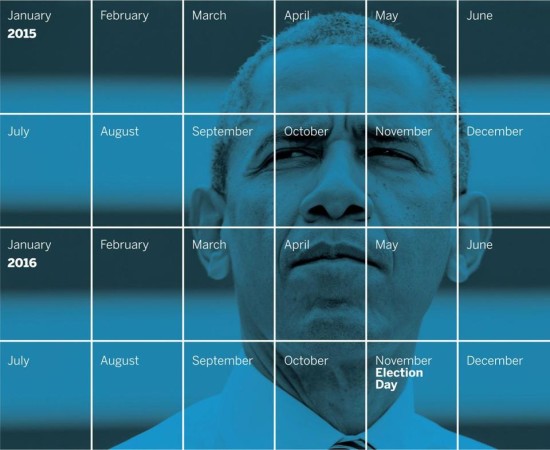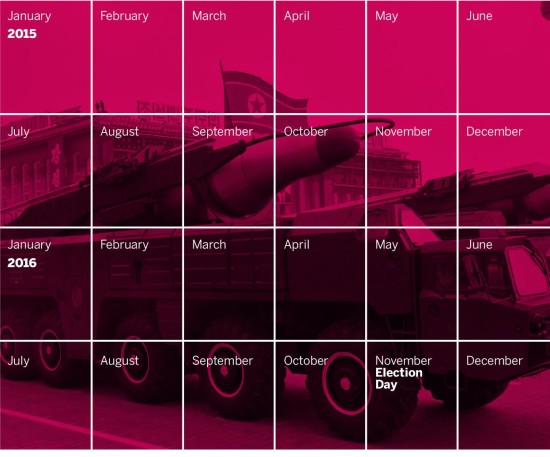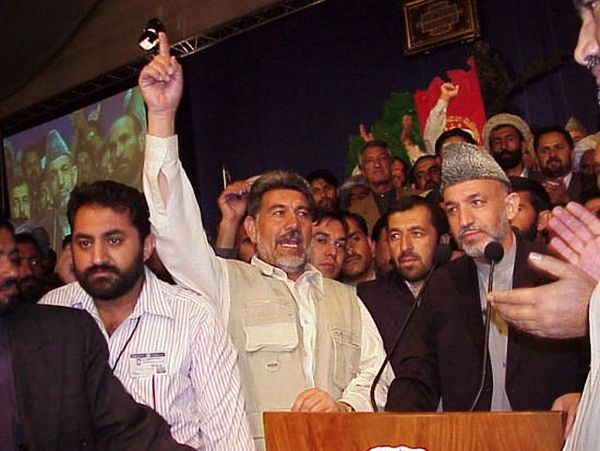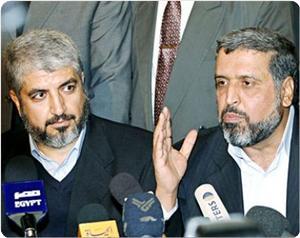Foreign policy wins Obama still can pull off
JACQUELYN MARTIN/AP;
GLOBE STAFF PHOTO ILLUSTRATION
Published in The Boston Globe Ideas.
LAST MONTH, in a pre-Christmas surprise, the White House announced a major foreign policy breakthrough on a front that almost nobody was watching: Cuba and the United States were ending nearly a half century of hostility, after secret negotiations authorized by the president and undertaken with help from the pope. Lately, America’s zigzagging on the grinding war in Syria and Iraq has attracted the most attention, but President Obama has punctuated his six years in power with a series of foreign policy flourishes, among them ending the long wars in Iraq and Afghanistan; launching an international military intervention in Libya; and a “reset” with Russia, which ultimately failed.
Time is running short. Obama has only two more years in office, and an oppositional Congress that will likely block any major domestic policy initiatives. But the president’s opening with Cuba raises a question. What other foreign-policy rabbits might this lame-duck president try to pull out of his hat?
Obama often talks about the arc of his history and his legacy. And we know from history that presidents in the sunset of their terms often turn their focus to foreign policy, where they have a freer hand. The presidential drift abroad has been even more pronounced in administrations that face an opposition Congress and limited support for any ambitious domestic agenda items.
Despite keeping his promises to end two wars and to reestablish America’s power to persuade, not just coerce, Obama has drawn some scorn as a foreign policy president. Poobahs across the spectrum from right to left have derided him for not having a policy (drifting on Syria, passively responding to the Arab Spring), for naively pursuing diplomacy (the reset with Russia, the pivot to Asia), for adopting his predecessor’s militarism (the surge in Afghanistan, the war on ISIS).
But, free from any future elections, the president may finally be at liberty to engineer bigger symbolic moves, like the recent rapprochement with Cuba. He can even try for politically unpopular policy realignments that would ultimately benefit his successor.
So what bold gambits might Obama reach for in his final two years? We’re talking here about unlikely developments, but ones that, with a push from a willing White House, could actually happen. Here’s a look at what might be on Obama’s wish list, and his real chances of grabbing any of these wonky Holy Grails.
A stand on torture
IN ITS WAR ON TERROR, America adopted a number of tactics that its leaders used to call un-American. Some of them appear here to stay, like remote-control bombing runs by robot planes (known by the anodyne moniker “drone strikes”), which have killed more than 2,400 people and have become the most common way Obama pursues suspected militants in Pakistan, Afghanistan, and Yemen.
But other tactics have lingered long after the White House has concluded they are counterproductive: most notably the use of torture, and the indefinite detention of enemies without charge or trial in the limbo prison at Guantanamo Bay. President George W. Bush, toward the end of his term, backtracked on both policies, quietly roping in the use of torture and exploring ways to shut down Gitmo. Obama has taken a more assertive moral stance on the issue, perhaps because he realized that America’s treatment of detainees delivered a propaganda boon to its enemies—and increased the risk of similar mistreatment for American detainees. But though he ended torture, he hasn’t settled the political debate, nor has he managed to close Guantanamo Bay.
This is one problem that Obama could resolve by fiat, if he were willing to deal with the inevitable political yelps. He could close Guantanamo Bay overnight, sending dangerous detainees to face trial in the United States, shipping others to allied states like Saudi Arabia, and releasing the rest (many of whom have spent more than a decade incarcerated). To those who would accuse him of putting America at risk by not detaining accused terrorists without charge forever, Obama could point to the US Constitution and shrug his shoulders. As for torture, some believe the best move would be to follow the South African model of a truth commission that airs all the grisly details, while granting immunity from prosecution to those who testify. Of course, critics of torture would decry the amnesty, and supporters would decry the release of narrative details.
Harvard political scientist Stephen Walt says to forget the truth commission. The simplest way for Obama to end one of the most contentious debates in America, he argues, is with a set of sweeping pardons for all those involved in torture. That could include officials from Bush on down, as well as leakers like Chelsea Manning. In an e-mail, Walt said such a move would be a “game changer,” although one with odds so long that he put it in the category of “foreign policy black swans.” “I regard it as very, very unlikely, but it would be a huge step,” he said.
Presidential pardons could make clear that torture and extrajudicial detention were illegal mistakes, while simultaneously freeing whistle-blowers and closing the books on the whole affair. Obama could even wait until after the 2016 presidential election has been decided, altogether eliminating political risk.
A détente with North Korea
EPA/KCNA ; GLOBE STAFF PHOTO ILLUSTRATION
NORTH KOREA entered the news recently because of its alleged role in the Sony hack over the silly film “The Interview.” But the hermit kingdom isn’t a problem because of its leader Kim Jong-un’s absurd cult of personality. No, North Korea poses a problem because it’s a belligerent, opaque, hyper-militarized state that stands outside the international system and is armed with serious rockets, nuclear warheads, and a powerful military.
One fraught area remains the demilitarized zone between North and South Korea. About 30,000 American personnel are deployed there, and North Korea routinely provokes deadly clashes to remind the world of its resolve.
If Obama could finally end the Korean war—officially just in a cease-fire since 1953—he would resolve the most dangerous flashpoint in Asia and perhaps the world. Kim Jong-un, like his father and grandfather, has an almost mythic status among villainous world leaders. Millions have suffered in North Korea’s prison camps, and the militarized state maintains a hysterical level of propaganda that makes it stand out even among other “rogue” states. Even China, long the dynasty’s primary backer, has begun to express irritation with North Korean’s volatility.
But all this creates an opportunity, according to veteran Korea watchers. “There’s an opportunity, oddly enough,” says Barbara Demick, author of “Nothing to Envy: Ordinary Lives in North Korea.” “It would require a bold gesture on somebody’s part.”
Kim Jong-un, third in the family dynasty, has lived abroad and appears more open-minded than his father, Demick says. More importantly, despite the anti-American rhetoric, North Korea might want to end its comparatively young feud with the United States, which dates only to the 1950s, to better protect itself from the local threat from its millennial rival China.
Earlier efforts at reconciliation in the early 1990s foundered and collapsed after Kim Jong-il cheated on an agreement to freeze his nuclear weapons program. Demick and other experts are more hopeful that his son will be more interested in negotiating. Three years after taking over, Kim Jong-un seems to have consolidated power. He has relaxed some control over private trade, and he executed a senior member of his own regime who was considered China’s man in Pyongyang, asserting himself over rivals within his family and government.
“Unlike his father, Kim Jong-un doesn’t seem to want to spend his whole life as the head of a pariah state,” Demick says.
It’s quite difficult to imagine North Korea doing an about face and becoming a friendly US ally in Asia, but surprising things have happened. Vietnam, just a few decades after its horrifying war with the United States, is now as warm to Washington as it is to Beijing. Obama could try to end one of the world’s longest lingering hot wars by forging a peace treaty with Pyongyang.
A grand bargain with Iran
AMERICA’S RELATIONSHIP with Iran never recovered from the trauma of the US embassy takeover and hostage crisis of 1980. Iran, flush with oil cash and the messianic fervor of Ayatollah Khomeini’s revolution, has been at the center of regional events ever since. Iran has been perhaps the most influential force in the Arab world, helping to form Hezbollah, prop up the Assad dictatorship in Syria, and foiling America’s plans in Iraq.
Of late, attention has focused on negotiations over Iran’s nuclear program, but that’s arguably not the most problematic aspect of Iran’s power in the region. A regional proxy war between two Islamic theocracies awash in petrodollars—Shia Iran and Sunni Iraq—has contaminated the entire Arab world. Resolving Iran’s major grievances and reintegrating it into the regional security architecture would reduce tensions in several ongoing hot wars and dramatically reduce risks across the board.
Obama could seek an overall deal with Iran, in which Tehran and its Arab rivals would agree to separate spheres of influence in the region and the United States could reopen its embassy. A Tehran-Riyadh-Washington accord could signal a major realignment in the region and a move toward a more stable state order, and is actually possible—not likely, but possible.
The big protagonists here, Iran and Saudi Arabia, lose a lot of money in their proxy fighting. It’s been 35 years since the 1979 Iranian revolution that brought the ayatollahs to power, and both sides—Riyadh’s Sunni theocrats and Tehran’s Shia ones—have learned that no matter what human and financial resources they pour in, they can’t achieve regional hegemony. Eventually, they’re going to have to coexist. Israel, meanwhile, has maintained a fever pitch about Iran, and should welcome a calming shift.
The trick for today’s White House is what’s going on internally in Iran. “My sense is that if Obama and Kerry could push a button and normalize relations with Iran they’d do so in a heartbeat,” says Karim Sadjadpour, who studies Iran at the Carnegie Endowment for International Peace. “The biggest obstacle to normalization is not in Washington, it’s in Tehran. When your official slogan for 35 years is ‘Death to America,’ it’s not easy to make such a fundamental shift.” But if Iran’s president can find a way to de-fang the hard-liners in his own country, Sadjadpour believes, there’d be a strong constituency among the political elites in Iran and the United States for a grand bargain.
A step back from Israel
PRESIDENT AFTER presidenthas poured time and energy into a Middle East peace process that never works. Failures have cost America political prestige around the world. As more governments lose patience with the continuing Israeli occupation of Palestinian territory, America has found itself defending the Israeli government at the United Nations even as the same Israeli government openly mocks Washington’s agenda.
The bold move that the president could make—potentially changing the parameters of the Israeli-Palestinian conflict—would be not to invest more in some new variant of the peace process, but simply to care less. Cooling our relations with the Israeli government could reestablish the strategic calculations at the core of the relationship and remove the distracting secondary issues that have accumulated around it. Israel is one of America’s closest military and economic allies, and the tightly woven relationship will survive a political shift. Obama could simply announce that the United States would no longer act as Israel’s main international political advocate, and that we would be happy to let other actors try to negotiate agreements, as the Norwegians did in the early 1990s.
Such a move would not resolve the Israeli-Palestinian conflict, but it would go a long way toward reducing costs for the United States. Washington doesn’t need to own the baggage of its close allies. It could treat Israel like it treats the United Kingdom: as a special ally with extra privileges, but one whose bilateral conflicts are its own business.
“I realize that a president’s hands are tied by Congress when it comes to Israel, but there is plenty that the president can do without congressional approval,” says Diana Buttu, a lawyer and former adviser to the Palestinian Authority. She said that Obama has plenty of options, from using his bully pulpit to condemn Israeli actions to not blocking Palestinian UN resolutions.
Duke political scientist Bruce Jentleson suggests another kind of US surprise: incorporating Hamas into peace talks. “A delicate dance no matter what,” he wrote in an e-mail. “But Middle East peace breakthroughs have usually been through the unexpected,” like Egyptian President Anwar Sadat’s trip to Jerusalem, or the secretly negotiated Oslo Accords.
What Jentleson says of Middle East breakthroughs may well be true of other ones as well. Global politics never loses its capacity to catch us off guard, regularly delivering events that experts say are impossible. Only an inveterate optimist would bet money on any of these slim possibilities coming to pass. But only a fool would be certain that they won’t.
Why the Hezbollah Blacklisting Is Pointless
[Originally published in The Atlantic.]
Today, the European Union designated Hezbollah’s “military wing” a terrorist group.
Aside from the fact that the very notion of a separate military wing is an absurd fiction, and that the designation has almost no chance of influencing Hezbollah’s behavior, is there any reason to care?
I would argue that yes, there is; terror designations carry real consequences — if not the ones their authors intend. On balance, I believe that when Western countries blacklist groups they define as terrorist, it harms their own policy aims much more than it does the targeted group. Talking to “terrorists” is political unpopular, but also necessary. It’s one of many tools required to deal with violent non-state actors, along with intelligence work, policing, force, and economic levers.
In the case of Hezbollah, the European Union will now join the U.S. and member governments like Britain in making it all the more difficult to find political solutions to the imbroglios of the Levant. Hezbollah is a major combatant in Syria, while at home in Lebanon it’s the largest and most influential elected political movement.
Hezbollah’s behavior is often frustrating (to its Lebanese rivals as well as to Western governments), and it has been credibly linked to violent plots, political assassinations, and pedestrian organized crime like drug dealing and money laundering.
Naturally, the European Union would like to find ways to curtail Hezbollah’s reach, especially after the group was found responsible for a deadly bombing in Bulgaria and a foiled attack in Cyprus.
But what does a terrorist designation achieve, and at what cost?
First, it eliminates communication with Hezbollah, putting even further out of reach meaningful diplomacy on the Syrian conflict and on Lebanon. It also necessitates foolish gymnastics for states that continue their relationship with the Lebanese government as if Hezbollah weren’t the primary power within that government. Effectively, it amounts to a blanket ban on dealings with Hezbollah, since the Party of God does not make any distinction between its military, political and social work; the organization is seamlessly unified, its fighters as distinct from the supreme leadership as America’s Pentagon is from the White House.
Second, it ties the EU’s hands in acting as a regional broker. How can the EU leverage its power across the Levant’s many conflicts if it won’t talk to one major player, and in fact has taken the step of branding it a terrorist group while leaving alone other factions who engage in similar violence?
In a reality where Hezbollah is a key central player, it makes little to no sense to erect a cone of silence around them (already some governments, like Britain, don’t talk to Hezbollah officials, following the U.S. lead). Any significant political accord in Lebanon must include Hezbollah, just as any political resolution of the Syrian conflict will have to include Iran and Hezbollah, along with the other states that sponsor the rebels and the government. Any other approach is simply a denial of reality and doomed to fail.
Third, the designation will hardly dent Hezbollah. Already Hezbollah operatives linked to violence or terror plots in the West are subject to prosecution in Western courts. Already, Hezbollah’s operations in the West are underground. If agents of Hezbollah are raising money for the group by trafficking narcotics in South America, or are training sleeper cells in Germany, how will the designation stop them? These already are secret, illicit operations; law enforcement and intelligence work might thwart them, but not blacklists.
Logic and experience both teach us that politics requires buy-in from the major stakeholders; that’s even more true in conflict resolution. You don’t make peace with your friends. You can’t influence a war — or an unstable polity like Lebanon — without points of entry to all the major players. It simply doesn’t work.
Historically, blacklists have never worked. Studies have shown that in a small proportion of “terrorist” groups are eliminated by force, but in the vast majority of cases when they give up violence, it is because of a political settlement.
In the case of Hezbollah (like Hamas and a plethora of Iranian institution before it), the blacklisting Western governments are setting themselves up at best for embarrassment and hypocrisy, and at worst for failure.
Ultimately, they will either let conflicts simmer on and do nothing about them (as they largely have in Syria), in which case blacklisting is just one element of a general diplomatic withdrawal. Or else they will get involved with political negotiations, talks, and maybe an agreement that will require them to make deals with the very groups that they earlier designated as beyond-the-pale terrorists with whom any parley whatsoever is unacceptable. When reality prevails, the Western governments end up in tortuous talks through intermediaries, or else they simply ignore their entire directive.
There is almost nothing gained from a terror designation other than the public relations bounce and perhaps some domestic political credit with the tough-on-terror crowd.
But only politics and long-term strategy stand a chance at limiting Hezbollah violence and shifting Hezbollah’s political priorities. It’s unlikely that a smart Western policy would result in a behavior change from Hezbollah, but it’s guaranteed that a terror designation won’t do the trick — and in fact, will only further limit the West’s poor options.
4 Lessons from the Israel-Hamas deal
Hundreds of Palestinian prisoners have been released and Gilad Shalit is home. How will this deal shape regional dynamics in the years to come? I’ve been studying “engagements with hostile non-state actors” for several years (another name for the subject is “talking to terrorists”), and like the many scholars and diplomats who have written on the subject, I have plumbed the yawning crevasse between rhetoric and practice. Western nations don’t talk to groups they’ve designated as terrorists, unless those groups have something they want. Historically, the U.S. and Israel almost always talk to their enemies.
What can we expect as strategic payoff from the Hamas-Israel prisoner exchange?
1. Israel’s enemies know that hostages are their best investment. Hezbollah reaped an asymmetrical deal in 2008 that did wonders to consolidate its power in Lebanon, trading two dead Israeli soldiers for live prisoners and nearly 200 bodies. The Hamas trade values one living captured Israeli as equal to about 1,000 living Palestinian prisoners. Hamas, Hezbollah, and other resistance groups now have every incentive to capture Israelis, dead or alive, and barter them. It’s officially an established tactic. “If one episode of this epic is finished there are others that we will go through till all prisoners are realized,” Hamas said in a statement published on its website. Hezbollah was equally direct, listing three decades of prisoner swaps and declaring, “These deals, along with the accord achieved today, have taught Zionist entity that the Israeli troops are under the reach of resistance heroes, who proved that this enemy doesn’t understand but the language of power.”
2. Force is better than politics at kick-starting negotiations. Peace talks between Israel and the Palestinian Authority have gone nowhere for years. Mahmoud Abbas’ application for statehood was treated almost like a declaration of war. Meanwhile, the Palestinian faction that actually acts like it’s at war with Israel and denies its right to exist extracted a favorable deal for itself after five years of negotiating over its hostage.
3. Corollary: Israel responds to violence. Hamas has argued since 2005 that its rockets and other attacks from Gaza drove Israel to dismantle its settlements there. That argument has an echo in Israel’s withdrawal from South Lebanon in 2000 and disastrous battlefield performance against Hezbollah in 2006. Those, like Palestinian Authority Prime Minister Salam Fayyad, who argue for a political rather an armed resistance, will have an even harder time now.
4. Egypt is more a bystander than a player on Israel-Palestine. There was some analytical hot air about the boost this deal will give its brokers in Cairo and Gaza, but let’s be pragmatic. Hamas is in trouble with its constituents in Gaza and the enthusiasm for the deal is unlikely to reverse the steady erosion of the Hamas government’s popularity in the strip. Similarly, the military rulers in Egypt were praised for spurring along the role, but their popularity depends on whether they secure Egypt. If Hamas moves its headquarters from Damascus to Cairo, then Egypt might gain some leverage.
Rather than a breakthrough, this should be perceived as historically continuous with previous deals, including the 2008 release of Samir Quntar to Hezbollah and previous swaps of Israeli corpses for prisoners in 1996, 1998, and 2004. In short, this deal makes quick shrift of the fiction that Israel “doesn’t talk to terrorists,” and it reinforces the conflict dynamic.
(Originally published here in The Atlantic.)
WBUR’s Here & Now
Robin Young brought me into the studio on Tuesday to talk about my column in The Boston Globe about “engagement hawks,” the pragmatists who argue that America needs a more coherent strategy to deal with terrorist-designated groups and other enemies.
Talk to Terrorists
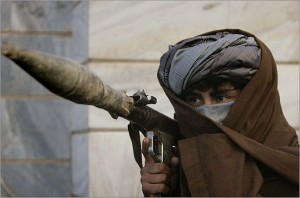 The Internationalist, my new monthly column about foreign affairs, debuted today in The Boston Globe Ideas section. The opening column explores the views of a cohort I call “engagement hawks,” who offer a pragmatic, utilitarian critique of the traditional argument that negotiating with terrorists makes us weaker. These thinkers and practitioners have articulated an intellectual critique of America’s historical position, and have tried to extract lessons from America’s sometimes-bumbling experiences since the Cold War reconciling — or trying and failing to do so — with enemies it has labeled “terrorists.”
The Internationalist, my new monthly column about foreign affairs, debuted today in The Boston Globe Ideas section. The opening column explores the views of a cohort I call “engagement hawks,” who offer a pragmatic, utilitarian critique of the traditional argument that negotiating with terrorists makes us weaker. These thinkers and practitioners have articulated an intellectual critique of America’s historical position, and have tried to extract lessons from America’s sometimes-bumbling experiences since the Cold War reconciling — or trying and failing to do so — with enemies it has labeled “terrorists.”
Ronald Reagan framed the debate over whether to talk to terrorists in terms that still dominate the debate today. “America will never make concessions to terrorists. To do so would only invite more terrorism,” Reagan said in 1985. “Once we head down that path there would be no end to it, no end to the suffering of innocent people, no end to the bloody ransom all civilized nations must pay.”
America, officially at least, doesn’t negotiate with terrorists: a blanket ban driven by moral outrage and enshrined in United States policy. Most government officials are prohibited from meeting with members of groups on the State Department’s foreign terrorist organization list. Intelligence operatives are discouraged from direct contact with terrorists, even for the purpose of gathering information.
President Clinton was roundly attacked when diplomats met with the Taliban in the 1990s. President George W. Bush was accused of appeasement when his administration approached Sunni insurgents in Iraq. Enraged detractors invoked Munich and ridiculed presidential candidate Barack Obama when he said he would meet Iran and other American adversaries “without preconditions.” The only proper time to talk to terrorists is after they’ve been destroyed, this thinking goes; any retreat from the maximalist position will cost America dearly.
Now, however, an increasingly assertive group of “engagement hawks” — a group of professional diplomats, military officers, and academics — is arguing that a mindless, macho refusal to engage might be causing as much harm as terrorism itself. Brushing off dialogue with killers might look tough, they say, but it is dangerously naive, and betrays an alarming ignorance of how, historically, intractable conflicts have actually been resolved. And today, after a decade of war against stateless terrorists that has claimed thousands of American lives and hundreds of thousands of foreign lives, and cost trillions of dollars, it’s all the more important that we choose the most effective methods over the ones that play on easy emotions.
Pointless peace process?
 Writing today in The Daily Beast, I ask why Washington appears to invest so much hope in the latest direct talks between Israel and the Palestinian Authority. People I talked to in the Middle East as these talks were getting underway were almost universally resigned in advance to failure on this round.
Writing today in The Daily Beast, I ask why Washington appears to invest so much hope in the latest direct talks between Israel and the Palestinian Authority. People I talked to in the Middle East as these talks were getting underway were almost universally resigned in advance to failure on this round.
Two suggestions diplomats and observers in the region made: bring actors like Hamas and the Israeli opposition into the talks, and change the structural incentives for Israel and Palestinian parties, which currently reward the status quo.
Not a single person I interviewed in the Middle East during the last two months expected anything to come of the current talks—certainly not anything good—although, for the record, no one predicted either that a failed peace process would unleash a new intifada or wholesale change in Israeli priorities.
Instead, the Arab diplomats, analysts, and activists who support Hamas and Hezbollah with whom I spoke seemed in accord that for the time being, neither the Israelis nor the Palestinians saw anything to gain from dialogue, except for earning chits with Washington.
The main benefit of a peace process, in this view, is that Washington wants one, and so long as it doesn’t cost anything, Washington’s allies in Ramallah and Jerusalem are happy to oblige.
Britain Reconsidering Hezbollah Channel?
 In a recent interview with Asharq Alawsat, the United Kingdom’s new Conservative Minister for the Middle East Alistair Burt said that Britain was reconsidering its policy of limited relations with Hezbollah. In 2008, after a three-year hiatus, the British Foreign Office quietly resumed its policy of allowing diplomats to talk to Hezbollah’s “political wing,” making a distinction between the organization’s political and military sides that Hezbollah itself does not.
In a recent interview with Asharq Alawsat, the United Kingdom’s new Conservative Minister for the Middle East Alistair Burt said that Britain was reconsidering its policy of limited relations with Hezbollah. In 2008, after a three-year hiatus, the British Foreign Office quietly resumed its policy of allowing diplomats to talk to Hezbollah’s “political wing,” making a distinction between the organization’s political and military sides that Hezbollah itself does not.
Burt didn’t say the U.K. would cut off the limited dialogue between its diplomats and Hezbollah’s elected members of parliament, but that the British government would review all future contacts:
It is still too early to say if we are going to adopt the approach of the previous government with regards to distinguishing between the political and military wings of Hezbollah. … There may be occasions where limited communication would be in everybody’s interests and the interests of the peace process in general. However we will place such communication under constant review, and on a case by case basis.
The British Labor government kept more open channels with Middle Eastern militants than the United States has, at times drawing rebukes from Washington. It will be interesting to see whether the new Conservative government continues the same approach.
Terrorist Talkers
 It’s a banner day for the topic I’ve been researching all spring : What tools beyond direct force can Western government use to engage, modulate or otherwise shape the behavior of listed terrorist groups? I’ve been studying in particular the use of intelligence community contacts, diplomacy, creative government engagement through aid and trade, and Track Two diplomacy (which we might as well call secret negotiations, since almost all of the important initiatives take place with the full knowledge of the governments involved).
It’s a banner day for the topic I’ve been researching all spring : What tools beyond direct force can Western government use to engage, modulate or otherwise shape the behavior of listed terrorist groups? I’ve been studying in particular the use of intelligence community contacts, diplomacy, creative government engagement through aid and trade, and Track Two diplomacy (which we might as well call secret negotiations, since almost all of the important initiatives take place with the full knowledge of the governments involved).
In the wake of last week’s Supreme Court ruling on the material support statute, which holds that political advice amounts to assistance for terrorist groups, several advocates of off-line diplomacy have reiterated their arguments for engagement.
First comes Mark Perry, author of the book Talking to Terrorists published earlier this year. He argues that the United States, Europe and Israel gain nothing by boycotting groups like Hamas and Hezbollah, because those groups are here to stay and represent large and growing constituencies. Perry broke the story in March that General David Petraeus had told the White House that America’s pro-Israel stance was harming core national interests in the Islamic world. Now, he’s gotten his hands on another CentCom document in which he reports that some military propose that Hamas should be integrated into the Palestinian Authority security forces and Hezbollah into the Lebanese Army. Both groups, the authors of the military memo argue, should receive American military training, even though they’re defined as foreign terrorist organizations by the U.S. government. (The officers were on a so-called “Red Team” tasked with challenging assumptions and considering alternative ideas.)
The CENTCOM team directly repudiates Israel’s publicly stated view — that the two movements [Hamas and Hezbollah] are incapable of change and must be confronted with force. The report says that “failing to recognize their separate grievances and objectives will result in continued failure in moderating their behavior.”
Meanwhile, on the op-ed page of The New York Times today, the academics Scott Atran and Robert Axelrod write that informal diplomacy has played a crucial role in convincing terrorist groups to renounce violence and enter politics. They cite historical Track Two negotiations begun by private citizens in the transformation of the Palestine Liberation Organization and the Real Irish Republican Army. They also cite their own back-channel conversations with Palestinian militant groups, including Hamas and Islamic Jihad, which they said have yielded important insights.
Private citizens can talk to leaders who are off limits to policy-makers, and can report their findings; in this instance, Atran and Axelrod write, Islamic Jihad reveals itself as recalcitrant and committed to fighting Israel, whereas a Hamas leader suggested he would consider not just a truce (hudna) but peace (salaam). Atran and Axelrod caution that off-line private diplomacy requires expertise and discretion: “Accuracy requires both skill in listening and exploring, some degree of cultural understanding and, wherever possible, the intellectual distance that scientific data and research afford.”
It’s an uncomfortable truth, but direct interaction with terrorist groups is sometimes indispensable. And even if it turns out that negotiation gets us nowhere with a particular group, talking and listening can help us to better understand why the group wants to fight us, so that we may better fight it. Congress should clarify its counterterrorism laws with an understanding that hindering all informed interaction with terrorist groups will harm both our national security and the prospects for peace in the world’s seemingly intractable conflicts.
Advocates of such talks usually take care not to oversell their potential, given that talking to terrorists rarely yields quick results and frequently yields none at all, except for political fallout when secret talks are leaked. All three of these authors have written publicly about their private conversations with leaders of listed terrorist groups. Their conversations were conceived as part of a concerted effort to convince the groups in question to renounce terrorism and violence and pursue their grievances in a legitimate political forum.
It’s unclear whether the Supreme Court ruling would affect these freelance diplomats, who tend to report their foreign terrorist contacts to the government and conduct their diplomatic experiments more or less with their government’s blessing. But for now American law – and grand strategy – have perhaps intentionally left in a fuzzily defined gray area the question of what kind of engagement best complements national counter-terrorism efforts.
Can You Tell a Terrorist to Abandon Violence?
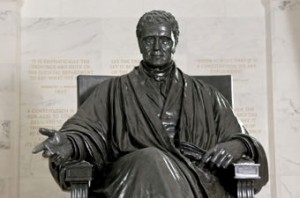 According to the U.S. Supreme Court, it appears that Americans aren’t allowed to interact with listed terrorist groups, even to provide them the kind of assistance that on its face would appear to conform precisely to American policy aims. In the case of Holder vs. Humanitarian Law Project, a group of American activists sought permission in advance before holding workshops to teach nonviolent political negotiation to a group listed as a foreign terrorist organization by the U.S. State Department. In this case, the groups involved were the Kurdistan Worker’s Party, or PKK, the militant Kurdish separatist group, and the LTTE, or Tamil Tigers, in Sri Lanka. The court ruled 6-3 that such assistance would violate American laws that prohibit providing material assistance to terrorists.
According to the U.S. Supreme Court, it appears that Americans aren’t allowed to interact with listed terrorist groups, even to provide them the kind of assistance that on its face would appear to conform precisely to American policy aims. In the case of Holder vs. Humanitarian Law Project, a group of American activists sought permission in advance before holding workshops to teach nonviolent political negotiation to a group listed as a foreign terrorist organization by the U.S. State Department. In this case, the groups involved were the Kurdistan Worker’s Party, or PKK, the militant Kurdish separatist group, and the LTTE, or Tamil Tigers, in Sri Lanka. The court ruled 6-3 that such assistance would violate American laws that prohibit providing material assistance to terrorists.
I will write at greater length about this case later, and the many complicated questions that it raises. But right off the bat, it makes me wonder:
- Are the go-betweens who take messages to listed terrorist groups and report on their meetings to U.S. diplomats now legally liable?
- What happens if a listed terrorist group wants to abandon violence and learn politics? Who is allowed to advise them?
- Do journalists violate the material support law when they interview members of listed terrorist groups and publish their statements?
- When the U.S. government sends out feelers to listed terrorist groups, using intelligence operatives or other means, are they violating the law? Or is the government itself exempt? Or is a secret presidential finding necessary?
- If teaching terrorists about human rights law is equivalent in the eyes of the law to giving money to terrorists, what are the implications for free speech? Have words and money, political speech and military donations, become indistinguishable in the eyes of the law? What further avenues of prosecution would be opened such a finding?
The Supreme Court decision is here. Read the news story and the editorial in The New York Times, and other links on the homepage of the Humanitarian Law Project.
Can Stan McChrystal’s Campaign Be Saved?
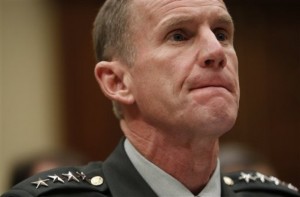 The nail-biting saga of General Stanley McChrystal’s Rolling Stone interview has riveted a wide audience whose interest in Afghanistan had otherwise flagged. Shortly we’ll know whether he keeps his job, and the hyperventilating will subside over civil-military relations (On life support? Healthier than ever?).
The nail-biting saga of General Stanley McChrystal’s Rolling Stone interview has riveted a wide audience whose interest in Afghanistan had otherwise flagged. Shortly we’ll know whether he keeps his job, and the hyperventilating will subside over civil-military relations (On life support? Healthier than ever?).
McChrystal’s personality aside, however, the American government needs to figure out something much more urgent and important: Is his counterinsurgency campaign in Afghanistan working? Based on what we’ve learned in the last year, can it work at all?
President Obama hired McChrystal to turn around a war that had stagnated. He was chosen to execute a nimble counterinsurgency strategy, a campaign designed to stabilize Afghanistan and win popular support among Afghanis, harnessing military, political and economic policy.
The prior strategy wasn’t working – the Taliban had made a dramatic comeback in the years since the original invasion in 2001. Even the most vocal proponents of counterinsurgency doctrine cautioned that it had no guarantee of succeeding. To give counterinsurgency a fighting chance might require more troops, money and time than the United States was willing and able to give. (That caveat presaged some early advocates’ current view that there were never enough resources tasked to make a COIN campaign viable.)
Now the U.S. is a year into McChrystal’s plan: the halfway point to the summer of 2011 when the surge is supposed to end and American troop numbers will be reduced. So much has gone off script, however, that it raises questions about whether McChrystal’s blueprint still applies.
- President Hamid Karzai has broken ranks, frequently attacking his U.S. patrons in public.
- The Taliban has gotten stronger militarily.
- The first showcase offensive in Marjah has so far failed to stabilize the town or deny the Taliban sanctuary there.
- This summer’s major showcase offensive in Taliban-dominated Kandahar has been indefinitely postponed.
- Pakistan has derailed efforts to negotiate with the Taliban, even arresting the Taliban’s number-two when he held clandestine meetings with the United Nations.
All these events don’t prove that the U.S. can’t achieve its aims in Afghanistan – but that’s the conclusion to which they’re beginning to point. Counterinsurgency defines the toolkit the military brings to the fight; it doesn’t actually answer the question of what America should do.
Over the next year, if it hopes to establish some lasting stable order in Afghanistan, America will need a far greater unity of effort between its generals, its diplomats, its special envoys, and its friends in the Afghan and Pakistani governments. With or without McChrystal, the United States will have to make course corrections in Afghanistan as the war unfolds.
Quick briefing materials
Fred Kaplan at Slate argues that McChrystal and his loose-lipped team reveal a war effort spinning of control.
Leslie H. Gelb at The Daily Beast argues that the Democratic Party suffers from a permanent culture clash with the military.
Andrew Exum writes a thoughtful post about whether the assumptions behind the current strategy in Afghanistan still hold up. He also struggles with the implications of firing/not firing McChrystal in these two posts.
In the “Is History Repeating Itself?” department we have Rajiv Chandrasekaran’s post-mortem on the last general fired from running the Afghan year, just about a year ago.
And finally, the Michael Hastings article in Rolling Stone that kicked off the fuss, and which – the scandal aside – raises pointed questions about whether the counterinsurgency strategy in Afghanistan makes any sense.
Hamas’ Tunnel Diplomacy
 My letter from Gaza just went up on Foreign Affairs. In the piece, I describe the similar ways that Hamas has responded to economic and political isolation, in one case with tunnels, in the other case with their diplomatic equivalent. The web of tunnels underneath the Gaza-Egypt border turned an economic crisis for Gaza into a new sphere of influence for Hamas. I liken the approach — improvise and then pretend afterwards it was part of a strategic plan — to the way merchants solve problems.
My letter from Gaza just went up on Foreign Affairs. In the piece, I describe the similar ways that Hamas has responded to economic and political isolation, in one case with tunnels, in the other case with their diplomatic equivalent. The web of tunnels underneath the Gaza-Egypt border turned an economic crisis for Gaza into a new sphere of influence for Hamas. I liken the approach — improvise and then pretend afterwards it was part of a strategic plan — to the way merchants solve problems.
Here’s the thesis:
At first, in 2007, Hamas only tolerated the tunnel economy; but it began to embrace it the following year, legalizing and regulating subterranean trade. Hamas had found a spontaneous solution to the economic crisis that was threatening its rule of Gaza — and, in the process, turned expediency into opportunity.
Opportunism as strategy appears to be the group’s new hallmark. When faced with only bad options to deal with the blockade or its status as a diplomatic pariah, Hamas has behaved as if it chose its predicament, leveraging its position into either greater control over Gaza or greater political influence beyond its boundaries. Desperation, in other words, has become an avenue to power.
Click here to read the whole piece.
One way Afghanistan could end up in a handbasket
This week, my graduate students at the New School ran a simulation of the coming year in Afghanistan. I kept the parameters loose and tracked the scenario closely to reality. (I’ve attached a list of the roles assigned at the end of this post.) They began in the present, April 2010, tasked with finding a way to minimize the amount of casualties and political instability before the summer. In a second round of play, set in July, the scenario stipulated that ISAF had invaded Kandahar without conclusively wresting control of the city from the Taliban. In the final round of play, set in October, the US was tasked with trying to usher in a settlement between the Afghan government and the insurgency.
Keep in mind that it’s only a game, but the results surprised me:
- India and Pakistan reached secret agreements over trade routes and insurgent funding.
- In the game, the U.S. played the most active role in brokering settlements between competing Afghan factions.
- Prompted by payments from the U.S., unsuccessful presidential candidate Abdullah Abdullah formed an alliance with Northern Alliance leader and defense minister Marshal Fahim, and the pair then made a secret deal with insurgent leader Gulbuddin Hekmatyar.
- Ahmed Wali Karzai, joined forces with disaffected Afghans and the CIA to plot a coup and assassination of his brother the president.
- In the final negotiations to set the terms for a new election, Taliban factions and other insurgents won a deal in which they agreed to take part in the ballot without being forced to renounce violence, and without any guarantees that they would honor the results.
- The U.S. was unable to resolve terms for how it would operate and fund a government that included Taliban, especially if the Taliban won the scheduled elections.
Of course, there are countless differences between a simulation game like this one and reality, not the least of which is that players who in real life would have difficulty passing simple messages through third parties can in the game easily converse with one another. Some lessons I took:
- If communications channels opened up, some hostile parties like India and Pakistan could find common ground on incremental details.
- Insurgents had a strong hand negotiating deals with the Afghan government and the U.S.; they could come to favorable terms and then defect as soon as it suited them with few consequences.
- The U.S. was severely constrained by the quality and reliability of its allies. It had no compelling alternative to Karzai. The Abdallah-Fahim-Hekmatyar alliance, far-fetched as it was, was inherently unstable and not likely to result in a stable government that could advance U.S. interests or secure Afghanistan.
- As in real life, it seemed like there were no good possible outcomes, only varying degrees of bad.
- Too many actors with two few constraints have the ability to destabilize Afghanistan and Pakistan. Even a brilliant and well-executed strategy would have difficulty accounting for all the different Afghan factions and regional players.
The players:
| CIA Kabul station chief |
| US Ambassador Karl Eikenberry |
| General Stan McCrystal |
| Richard Holbrooke |
| President Hamid Karzai |
| Ahmed Wali Karzai, President Karzai’s brother, Kandahar strongman |
| Marshal Mohamed Qasim Fahim, defense minister, Tajik Northern Alliance leader |
| Abdullah Abdullah, failed 2009 presidential candidate |
| Mullah Abdul Qayyum Zakir, deputy supreme leader, Taliban/Quetta Shura |
| Sirajudin Haqqani, leader of Haqqani network |
| Gulbuddin Hekmatyar, leader of Hezb-e-Islami militant faction |
| Local Popolzai chieftain, leader of unaligned Pashtun sub-tribe |
| Ashfaq Kayani, Pakistani army chief of staff |
| Lt. Gen. Ahmad Shuja Pasha, director-general of Pakistan’s Inter-Services Intelligence Agency |
| Shri S.M. Krishna, External Affairs Minister, India |
| Manouchehr Mottaki, foreign minister, Iran |
| Sergey Lavrov, foreign minister, Russia |
| UN Special Representative Staffan de Mistura (Sweden) |
| UN deputy Special Representative for Politics Martin Kobler (Germany) |
Engaging With Terrorists?
My students at Columbia are investigating American policy toward terrorist-designated non-state actors. They’re talking to American policy-makers, analysts and diplomats about Washington’s approach to intelligence-gathering and deal-making. They’re also looking at the experiences of other governments: Israel, Turkey, Saudi Arabia, Iran, members of the European Union. By the time they finish their project in May, they should have some concrete ideas about what works, what doesn’t, and ways that the Uunited States might more effectively promote its national interests.
